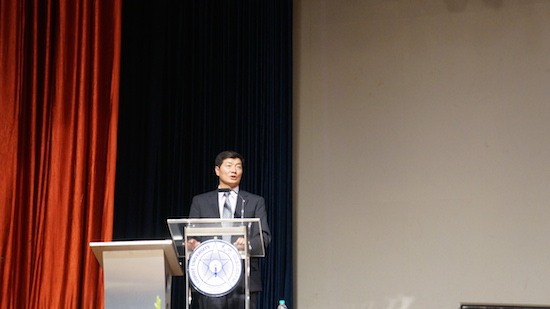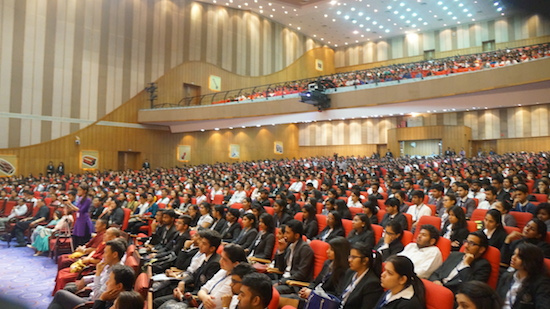BANGALORE – Sikyong Dr. Lobsang Sangay spoke on ‘Tibet, India and Asia – Geopolitical, Environmental and Historical relationship’ at Christ University in Bangalore on 14 December.
Sikyong was welcomed by an appreciative audience of students, especially from the Law and Political Science departments and the faculties.
Speaking on the relationship between Tibet, India and Asia from the geopolitical, environmental and historical perspective, Sikyong highlighted the intrinsic spiritual bond of teacher and student shared by India and Tibet from the sixth century.
Paying respect to the great Indian scholars like Nagarjuna, Shantideva, Kamalashila, and the founder of Tibetan Buddhism Guru Padmasambhava, Sikyong remarked on the Indian roots of Tibetan Buddhism.
“Buddha Dharma spread from India to whole of Asia and particularly Tibet. The Indian scholar from Nalanda University were the ones who introduced Buddhism in Tibet. Therefore, historically Tibetan monasteries here in India and the Tibetan scholars are scholars and monasteries of Nalanda tradition,” he said.
However, Sikyong went on to say that the practice of Buddhism as a distinct and organised religion gradually declined in the land of its birth, and the ancient Nalanda tradition was preserved in the form of Tibetan Buddhism.
“Therefore, we Tibetans take great pride in the fact that the best preserved Buddhist teachings are only in the Tibetan language. In some sense, we Tibetans brought the Nalanda tradition back in its origin,” he admitted.
Emphasising on the strategic importance of Tibet in the geopolitical engagements between India and China, Sikyong referred to the recent Chinese army incursions in Indian territory as an example. “Before Tibet was invaded, it served as a zone of peace between the two largest populated country in the world. Once China occupied Tibet, the buffer zone was removed”, Sikyong said, noting that restoration of Tibet as a buffer zone and as the guardian of Tibetan plateau is vital for India’s security and all the neighboring countries’ as well.
Sikyong then spoke on a more recent, environmental issue that China is reportedly diverging rivers from Tibet into China. He added that the Tibetan glaciers which contributes to the flow of these rivers are retreating at an alarming rate, posing an extra threat for the 1.3 billion people for whom these rivers are a source of life.
Referring to the water dispute between Karnataka and Tamil Nadu, Sikyong indicated the diversion of rivers from Tibet as a serious cause of concern for India and the downstream countries. “I am sure Karnataka and Tamil Nadu are witness to the huge debate between two states. If two democratically elected governments could argue over Kaveri river, you can imagine what would happen to whole of Asia as all the major rivers flow from Tibet”, Sikyong said.
As Sikyong said, Tibet with the third highest ice reserve, occupies a unique position in the world climate. He continued, “the good news is nearly 200 countries at the COP21 climate summit signed an agreement to keep global temperature rise well below 2 degree celsius.”



